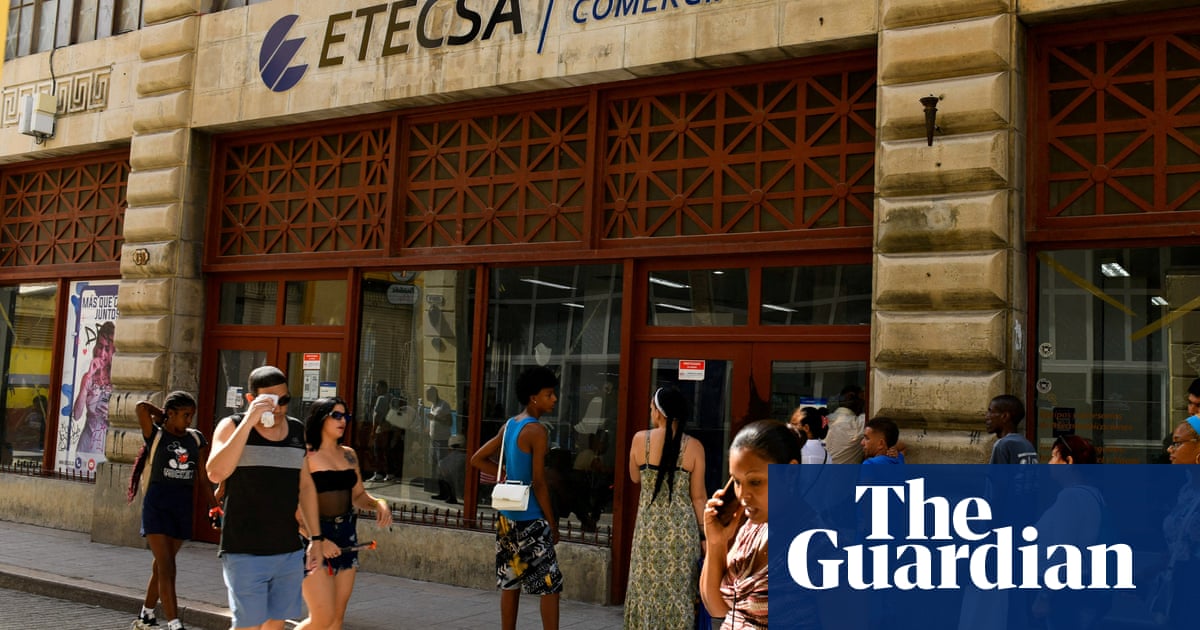Having enduredelectricity blackouts, water shortages, transport failures and the spiralling cost of food,Cuba’s students appear to have finally lost patience with their government over a ferocious price hike for the country’s faltering internet.
Local chapters of Cuba’s Federation of University Students (FEU) have been calling for a slew of measures, including attendance strikes, explanations from ministers and even the resignation of their own organisation’s president.
Trouble began when Etecsa, Cuba’s state-owned communications monopoly, recently increased prices for its mobile data without giving notice. While it offered 6GB a month at a subsidised rate of 360 pesos (about $1 at black market rates), prices would rise to 3,360 pesos ($9) for the next 3GB.
There was immediate uproar across a country where monthly state wages start at 2,100 pesos ($5.70) and the internet has become the route by which much of the population hears news, buys necessities, runs small businesses and communicates with relatives abroad. The average Cuban uses 10GB a month, according to the government.
The students, some of whom called their protest “brave, revolutionary and respectful”, said that while the internet was the trigger, real anger is aimed at Cuba’s communist government’s increasing reliance on US dollars.
In recent months, state supermarkets have opened across Cuba that only accept hard currencies. Gasoline stations are switching away from the peso. There are rumours electricity is about to follow. Each of these measures comes with foreign packages that encourage Cubans to ask their relatives abroad to pay.
“The ultimate responsibility for the problem falls not on the managers and employees [of Etecsa] but on those who implemented a chaotic, if not non-existent, economic model,” read a statement from the Telecommunications and Electrical Engineering department at CUJAE, one of Havana’s universities.
Tania Velázquez, Etecsa’s president, tried to explain on state television. “We find ourselves in an extremely critical situation due to the lack of foreign currency and the significant reduction in revenue in recent years,” she said.
But the student body of Havana University’s mathematics and computer sciences faculty (Matcom), swiftly expressed a widely held skepticism that any new money raised would lead to improvements.
It asked for a meeting with “those primarily responsible for the measures taken, where the context under which they were taken is clarified in details and transparency”. Meanwhile, it called for its students to stay away from classes.
The government blamed the six-decade old US embargo but, clearly concerned, responded. Miguel Diaz Canel, Cuba’s president, called the students “beloved”, organised meetings with students, and suggested the error had been one of communication. A concession was offered: a second highly subsidised package for university students alone. This was met with scorn by the engineering students from CUJAE, who called it “an attempt to silence the student vanguard”.
The protests have left the government’s usual critics in Miami wrong-footed as well, as they do not conform to the left/right debate that rages across the Florida Straits. Many student bodies made it clear they felt Etecsa’s move does not conform to the principles of the Cuban revolution, quoting revolutionary heroes including Fidel Castro.
It reflects a growing sense on the island that the government is moving away from its socialist principles, while not liberalising the economy enough to allow people to earn the money now needed to live.
Founded in 1922, the FEU once fought against Cuba’s pre-revolutionary dictatorships, but has been quiet since.
Michael Bustamante, chair of Cuban and Cuban-American Studies at the University of Miami, said: “I don’t think there is any comparable pushback to a government measure on this scale since university autonomy ended as it existed prior to the revolution.”
But the measures do come at a tough time for final year students, with only about two weeks of the semester to run, followed by important exams. On Monday, Matcom voted to return to their classes, despite the new rates “not being validated by real and convincing data”.
Transgressions in Cuba, political or otherwise, can lead to lifelong consequences for students, losing not only the ability to graduate, but also to find jobs.
A mother of a psychology student expressed her fears: “I support my daughter in whatever she decides,” she said. “But I feel her ambivalence and anguish. Her heart wants to be involved, but common sense tells her that she has to graduate.”
But another student, who asked to remain nameless, said a precedent has been set: “This has awakened something historic,” she said. “We have gained confidence and organisation for everything that troubles us in the future.”
Eileen Sosin contributed reporting
